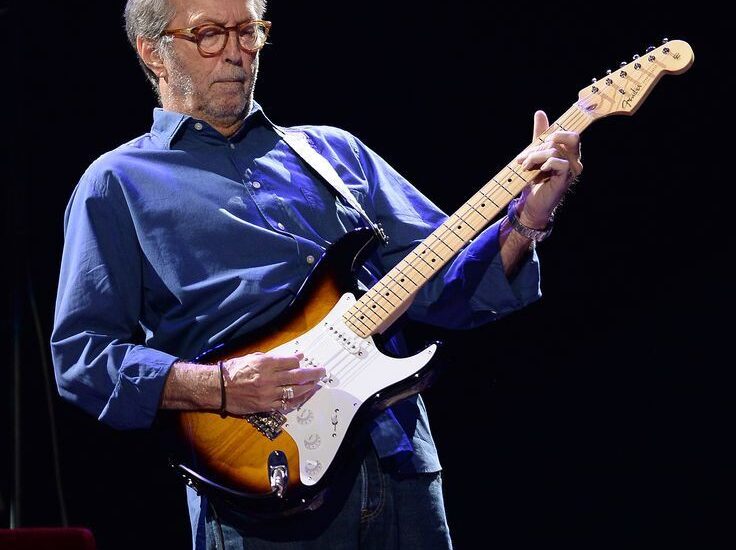
Just In:”In 1963, Eric Clapton joined The Yardbirds, marking his entry into the British blues-rock scene and setting the stage for his legendary career.”
In 1963, a young Eric Clapton joined The Yardbirds, a pivotal moment that would not only mark his formal entry into the British blues-rock scene but also lay the foundation for one of the most influential careers in the history of modern music. While Clapton would go on to become an iconic figure in rock and blues, his time with The Yardbirds was instrumental in shaping his sound and future contributions to the genre.
The Birth of a Blues Guitar Hero
Born in 1945 in Ripley, Surrey, Eric Clapton grew up surrounded by the sounds of American blues and R&B music, a style that would deeply influence his playing. As a teenager in the early 1960s, Clapton became enamored with the works of American blues artists such as Robert Johnson, B.B. King, and Muddy Waters. This passion led him to pursue a career as a guitarist, and by the time he was in his late teens, Clapton had already started playing with various bands in London’s burgeoning blues scene.
However, it wasn’t until 1963 that Clapton’s career truly began to take off. In that year, he was recruited to join The Yardbirds, a London-based rhythm and blues band. The Yardbirds, formed in 1962, were a vibrant part of the British blues scene, and their early work focused on American blues, particularly the sounds of Chicago blues legends. The band was also known for their energetic live performances and commitment to innovation in guitar-based music, which made them a perfect fit for Clapton’s raw and emotive playing style.
Joining The Yardbirds: A Critical Move
When Clapton joined The Yardbirds, the band was still in its formative stages, and they had yet to achieve the mainstream success that would come later. At the time, the Yardbirds had already recorded a few singles, including “Good Morning Little Schoolgirl,” which demonstrated their affinity for blues, and their high-energy performances had earned them a strong following on the London club scene. The band was at a crossroads, looking to refine their sound and solidify their place in the rapidly growing British blues and rock scenes.
Clapton’s arrival in the band brought a new level of virtuosity and authenticity to their sound. His deep understanding and love of the blues were immediately apparent in his guitar playing, and his proficiency on the instrument was unmatched by many of his peers. Clapton’s technical prowess, combined with his emotive playing, set him apart as a guitarist in a time when the guitar was becoming increasingly central to popular music.
Though Clapton initially struggled to find his own musical identity within the band, he was soon able to make his mark. His solos were fast, fluid, and emotive, a stark contrast to the more restrained styles of other guitarists at the time. He was known for playing with a sense of urgency and passion, often bending strings and employing a wide range of techniques, such as fingerpicking and slide guitar. His sound was distinct, and his ability to convey emotion through his playing became a hallmark of his style throughout his career.
The Yardbirds’ Early Success
With Clapton on board, The Yardbirds began to gain traction in the British music scene. The band released a series of singles that would become foundational to the British blues-rock genre, such as “For Your Love” and “I’m a Man.” “For Your Love,” written by Graham Gouldman, was a significant turning point for the Yardbirds as it marked their first major hit. However, Clapton was not entirely comfortable with the band’s shift toward a more commercial pop sound, and this tension would eventually lead to his departure.
While Clapton’s time with The Yardbirds was relatively short-lived, the experience had a profound impact on his musical development. His blues-based approach to guitar playing became a key influence on the band’s later sound, and his contributions to the group’s musical direction were critical during the pivotal years of their early success.
However, despite their growing popularity, Clapton became increasingly disillusioned with the band’s commercial aspirations. The Yardbirds, under the guidance of producer Giorgio Gomelsky, were pushing in a direction that Clapton didn’t agree with, focusing more on pop music and less on the deep blues that he cherished. His dissatisfaction culminated in his departure from the band in 1965, a move that would set him on a new and even more illustrious path.
The Aftermath: A Rising Star
Clapton’s departure from The Yardbirds was not the end of his journey but rather the beginning of a new chapter. After leaving the band, Clapton joined John Mayall & the Bluesbreakers, a move that would allow him to fully immerse himself in the blues and develop his signature style.
You may also like
Archives
Categories
- ABA
- Actor
- Actress
- Actress and singer
- Band
- Baseball
- Basketball
- Boxer
- Broadcasting corporation
- CCR
- cricketer
- Cyclists
- Dart
- Drummer
- Fictional character
- Football game
- Formula 1
- Golf
- Guitarist and songwriter
- Guitarists
- Gymnastics
- Hockey
- Ice hockey
- Marathon
- MLB
- Motocross
- MotoGP
- Motorcross
- Musician
- Musician and drummer
- NFL
- NHL
- NRL
- Racer
- Red bull Racing
- Rider
- Rock band
- Rugby league
- Simone Biles
- Singer and songwriter
- Songwriter and musician
- Sport commentator
- Tennis
- Texas longhorns
- Track and field athlete
- Uncategorized
Leave a Reply